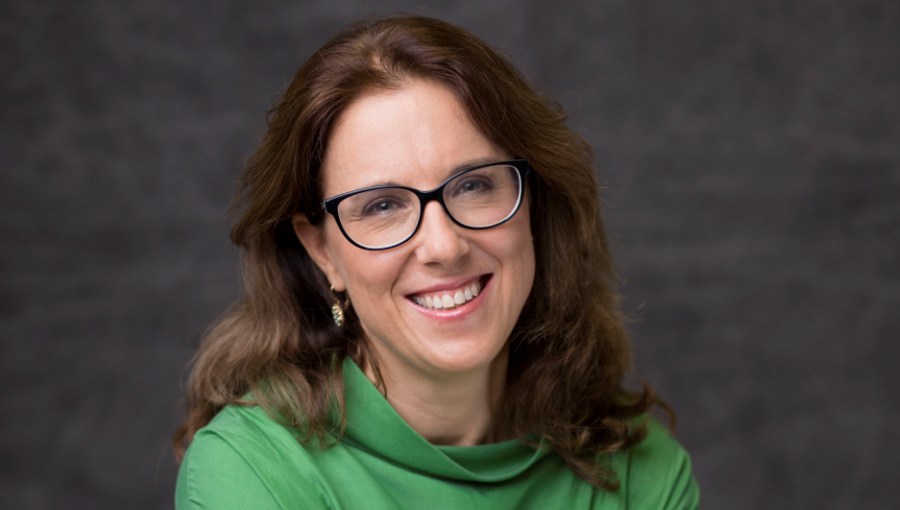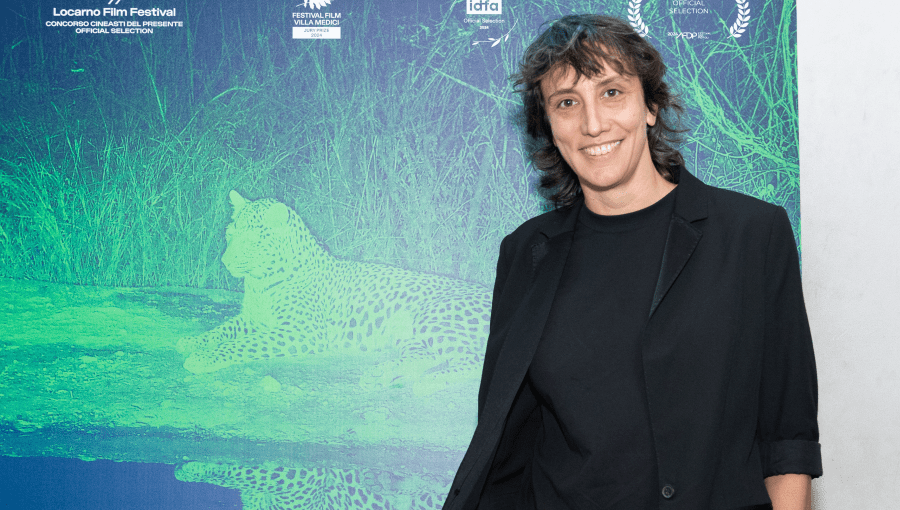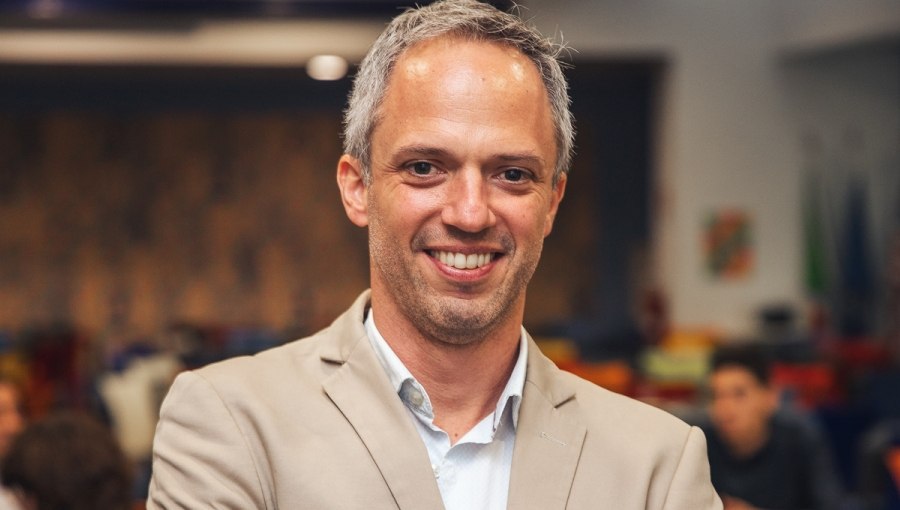Professor Moira Egan Wins Prestigious Poetry Translation Prize
Moira Egan, JCU Creative Writing professor, has won the 2023 Raiziss/De Palchi Fellowship of the Academy of American Poets for her translation of Letters of Black Fire by Italian poet Giorgiomaria Cornelio. This $25,000 prize is given for the translation into English of a significant work of modern Italian poetry. The fellowship enables an American translator to travel, study, or otherwise advance a work-in-progress. The winning translator also receives a five-week residency at the American Academy in Rome.

Originally from Baltimore, Maryland, Professor Moira Egan has published nine books of poetry (five in the U.S., four in Italy). Her most recent volume is the bilingual Amore e morte (Edizioni Tlon, 2022). Her poems and essays have been published in journals and anthologies on four continents. She has had writing fellowships at the Virginia Center for the Creative Arts (as a Mid Atlantic Arts Creative Fellow and as a CSG Fellow), the St. James Cavalier Centre for Creativity (Spazju Kreattiv) in Malta, the Civitella Ranieri Center in Umbria, Italy, the Rockefeller Foundation Bellagio Center on Lake Como, and the James Merrill House in Stonington, Connecticut.
Along with Damiano Abeni, her husband and translating partner, Professor Egan has published translations of poetry by John Ashbery, Frank Bidart, Lawrence Ferlinghetti, Ben Lerner, Charles Simic, Mark Strand, Ocean Vuong, and Charles Wright. Prose translations include works by John Barth, Aimee Bender, Sheila Heti, and Josephine Tey. Abeni and Egan recently did a 50th anniversary re-translation of Ferlinghetti’s A Coney Island of the Mind.
Academy of American Poets judges Jennifer Scappettone, Graziella Sidoli, and John Taylor said of Egan’s translation: “Moira Egan offers us Giorgiomaria Cornelio’s enigmatic, experimental, and truly contemporary voice in the present Italian poetic landscape with an English that fully matches his linguistic and challenging power. With equal beauty and ferocity, each one of her renditions is an astonishing new poem while remaining faithful to the original, which is the key to the exacting task of the translator.”
Professor Egan was recently interviewed by Professor Berenice Cocciolillo, who teaches Introduction to Professional Translation at JCU.
Congratulations on winning the 2023 Raiziss/De Palchi Fellowship of the Academy of American Poets Prize. What are the main challenges of translating poetry and Giorgiomaria Cornelio’s book in particular?
Thank you! I’m so pleased and honored to have had this manuscript chosen for the prize. Regarding Giorgiomaria Cornelio’s work, the judges captured it perfectly: his voice is “enigmatic, experimental, and truly contemporary.” The diction is sophisticated, the imagery intense and archetypal. One of the things that drew me to his work is the incredibly wide range of allusions and influences that he draws upon as inspiration.
Cornelio’s work is indeed experimental, playing around with language in ways that sometimes even seem odd in Italian. But I think that this quality translates very well into English, which, perhaps, holds a more comfortable space for the poems’ bent syntax, devices such as anthimeria, and a subversive sense of language that disrupts and calls attention to itself.
You are a widely published poet. How did you become interested in translation?
Though I’ve been studying (and loving) other languages since I was a youngster, I was never really interested in doing translations of my own. A telling incident: once, when I was a German Literature major at Bryn Mawr College, they couldn’t manage to locate some obscure 14th-century work in the original German. So we had to read it in translation! Quelle horreur! We were deeply inculcated with the idea that reading a work in translation was intellectually lazy.
And somehow that mentality stuck. Of course, in the real world, that’s silly: the context of an undergraduate majoring in a foreign literature is quite different from that of an adult who wishes to read great works written in languages they don’t know.
Flash forward some years: I often say that, when I married Damiano, I married into a life as a translator as well. Damiano has been translating for many decades now; he generously invited me into his prodigious activity and established career as one of the foremost translators of American poetry into Italian. I say that not because he’s my husband, but because everyone else says it. And because it’s true. So over the years, we have collaborated on multiple volumes of some great American poets.
What makes someone a good translator?
The reader recognizes it, I think, when they read a work in translation that seems natural and meaningful, not weird or forced or awkward (unless it was meant to be weird or forced or awkward). For example, when I read the English translation of Patrick Süskind’s novel, Perfume, I thought, “This is one of the best novels I have ever read.” I loved it so much that I had a friend bring me a copy from Germany. I read it in German and it was such a similar experience, as if I had already read the very book, because the translator had done such a wonderful job of carrying over the essence of the original German into the English.
My usual answers to questions like these are pretty unglamorous. There are no magic tricks. I think, to be a good translator, you have to read the text super-closely in the original and think about its effect on the reader in the original. Then, paying careful attention, it’s your job to transmit, as best you can, a similar effect to the audience who will be reading it in the target language. Traduttore/traditore, that old saw: I don’t think it’s inevitable if you pay very careful attention in both languages.
What are the advantages and challenges of working as part of a translation team with your husband?
It’s fun to work in tandem with someone you like (or even love); it’s like a piano piece for four hands. The greatest advantage, I think, is that each of us has spent a lifetime being passionately immersed in our own mother-tongue. Etymologies, subtleties, allusions: those are my job in English, and his job in Italian. And we both love poetry.
Challenges? Luckily, it doesn’t happen often that we disagree. It’s usually that I want something to be a bit wilder or wackier than Italian can contain, without its sounding “wrong.” But we manage to come to some solution that is acceptable to us both. And that should be a metaphor for many things in life.
What are the main differences between translating poetry and prose?
It’s very similar to the differences between reading poetry vs. reading prose: with poetry, you’re meant to slow down and pay attention to the words, the sound patterns, the images. Reading poetry stops you. Reading prose (whether it’s the narrative of a story or the argument of an essay) carries you along, the flow that’s inherent in the etymology of the word (Middle English: via Old French from Latin prosa (oratio) ‘straightforward (discourse’), feminine of prosus, earlier prorsus ‘direct’.)
The choices are slower and pickier in poetry. And of course, poetic forms: if you’re translating a sonnet, for example, it might not have the same rhyme scheme in the target language, but it should have a rhyme scheme. And even in translation, it should certainly be a sonnet!
As a professor of creative writing, what is your teaching philosophy?
I believe that becoming an ever-stronger reader of good literature is one of the most important ways to continue to grow as a writer. My classes emphasize close reading, open discussion, and constructive criticism that is always kind and considerate. My main goal as a professor is helping students to find and ever refine their own individual voices.
What tips and/or advice would you give to aspiring writers/translators?
Read, read, read. Works in the original, works in translation, works of every genre you’re remotely interested in. Read good literature. As I’ve said above and will always believe: you can’t be a serious writer/translator if you’re not a serious reader.
What projects are you currently working on?
The Raiziss/de Palchi Fellowship recognizes (and funds) a work in progress, so I’m happily plugging away at translating more of Cornelio’s poems. His most recent book, La specie storta (The Crooked Species) keeps winning prizes, so it’s my goal to get that entire volume done within a year.
As for my own work, I had a sabbatical last year, during which I finished writing the next book of poems, which is called The Furies. I’m hopeful about getting it out into the world soon. But at the moment, poetry-wise, I’m taking a breath and seeing which way the Muse will move me for the next collection.





